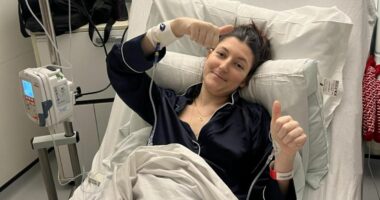Share this @internewscast.com
Frequently taking a common type of painkiller could trigger inflammatory bowel disease (IBD)—raising the risk of bowel cancer—experts warn.
Medics raised the alarm after treating an 18-year-old boy who developed colitis—a type of IBD—after taking over-the-counter allergy and pain relief medication continuously for almost three years.
IBD is a known risk factor for bowel cancer and experts have long warned that those who have had the condition for years are at increased risk of developing the disease.
The unnamed American teen sought medical help for bleeding from his rectum and extreme fatigue—according to doctors who shared his tale in a medical journal.
He told medics he had been taking diphenhydramine, an over-the-counter hay fever medication and a non-steroidal anti-inflammatory drug (NSAID), daily to combat debilitating headaches and allergies for almost three years.
NSAIDs are a class of painkiller—famous examples being ibuprofen, aspirin, and naproxen—which are commonly used to alleviate pain and swelling.
Pills combining diphenhydramine and NSAID are available in both the US the UK under brands like Advil PM and Motrin PM, as pain relief and sleep aids.
While not naming the brand of medication the teenager took, doctors said he had taken the equivalent of 600mg of NSAIDs twice a day.

Medics raised the alarm after treating an 18-year-old boy who developed colitis—a type of IBD—after taking over-the-counter allergy and pain relief medication continuously for almost three years. Stock image
Brands that make diphenhydramine and NSAID combination pills warn patients not to take more than two tablets in 24 hours, equivalent to around 400mg of NSAID.
Medics then performed a colonoscopy—where a thin flexible camera is inserted into the rectum—and found the tissue inside was severely inflamed.
Writing in the journal Cureus, medics said he was then diagnosed with colitis, a form of IBD which specifically develops in the colon.
They theorised that his frequent use of NSAID drugs had disrupted the production of mucus that protects the digestive system, causing irritation.
Irritation of the digestive system is a known risk of these drugs and as result they can lead to bleeding, ulcers and potentially colitis.
Some studies have linked using NSAID drugs with an 86 per cent increased chance of developing colitis.
The medics who reported the case said these increased risks are why doctors often prescribe a separate medication to patients’ who have to take NSAIDs frequently for chronic pain issues, in order to protect their guts from this potential damage.
However, they noted that their patient was an extreme example and occasionally using a medication like ibuprofen will not carry the same risk.

Bowel cancer can cause you to have blood in your poo, a change in bowel habit, a lump inside your bowel which can cause an obstructions. Some people also suffer with weight loss a s a result of these symptoms
But they added that the risk is something to be aware of given how readily patients are able to take these over-the-counter medications without medical supervision.
‘Given the widespread availability of these medications and their over-the-counter accessibility, it is imperative that patients suffering from chronic inflammation or long-term pain be advised to avoid NSAIDs, or to use them only under the direct guidance of a supervising clinician,’ they said.
In the teen’s case, once he was stable, he was prescribed anti-IBD drugs and told to stop using NSAIDs.
However, despite being scheduled for a follow-up colonoscopy, he never attended, so medics were unable to determine how successful this had been.
For years scientists have been unsure exactly what causes IBD to develop in some patients but not others.
Earlier this year, however, researchers in London discovered a genetic weakness present in 95 per cent of people with IBD.
An estimated half a million Britons and some 3million Americans are thought to have IBD, with the condition affecting more than 10million globally.
IBD arises when the immune system mistakenly attacks the bowel, causing an array of debilitating symptoms including abdominal pain, diarrhoea and blood in stools.
The disease can also cause sudden weight loss and crippling fatigue.
While no cure is available, symptoms can be managed with drugs. These tend to be most effective when given soon after diagnosis.
Estimates vary on exactly how much having IBD increases the risk of bowel cancer, with some charities citing studies which found it raises it by 7 per cent compared to the general population.
But charities are keen to highlight that the vast majority of patients with IBD won’t develop the disease.
They do, however, advise people with IDB to keep in mind other risk factors for the cancer, such as smoking, drinking alcohol and being overweight that could further increase their individual risk.
It comes as experts have repeatedly warned of a concerning and mysterious rise in rates of bowel cancer among under 50s.
A recent global study found rates of bowel cancer in under 50 year-olds are rising in 27 of 50 nations.
England is averaging a 3.6 per cent rise in younger adults every year-one of the highest increases recorded.
While the disease is known to be linked to obesity, experts have noted that the disease also seems to also be occurring in fit and healthy patients.
Some believe the explanation must lie in environmental factors young people have been exposed to more than previous generations.
Signs of bowel cancer include abdominal pain, a lump in the abdomen, bloating and feeling very tired or short of breath.
Bleeding from the back passage, or blood in the stool, occurs when cancerous tumours bleed into the digestive tract.
However, bowel cancer can also appear with no symptoms until it has spread, where it becomes harder to treat.
Overall, just over half of bowel cancer patients are expected to be alive 10 years after their diagnosis.













